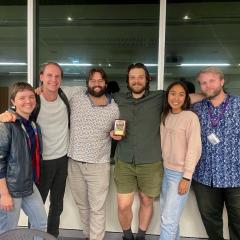In 2023, the School of Historical and Philosophical Inquiry was host to an interdisciplinary project “The Limits of Consent”, led by historian Professor Lisa Featherstone. Funded by a grant from the University of Queensland, the project brought together historians, social scientists, feminist scholars, psychologists, criminologists and others, to work on various aspects on consent and gendered violence. The most recent output from the team is a cross-disciplinary, co-authored monograph, by Lisa Featherstone, Cassandra Byrnes, Jennifer Maturi, Kiara Minto, Renee Mickelburgh and Paige Donaghy, published with Palgrave Macmillan, which explores historical and contemporary ideas of both consent and affirmative consent. In 2023, the School of Historical and Philosophical Inquiry was host to an interdisciplinary project “The Limits of Consent”, led by historian Professor Lisa Featherstone. Funded by a grant from the University of Queensland, the project brought together historians, social scientists, feminist scholars, psychologists, criminologists and others, to work on various aspects on consent and gendered violence. The most recent output from the team is a cross-disciplinary, co-authored monograph, by Lisa Featherstone, Cassandra Byrnes, Jennifer Maturi, Kiara Minto, Renee Mickelburgh and Paige Donaghy, published with Palgrave Macmillan, which explores historical and contemporary ideas of both consent and affirmative consent.
The book begins with a conundrum. Despite decades of discussion, sexual violence has become an endemic problem, resistant to social and legal change. To begin to tackle this, some jurisdictions have begun to shift to a model of “affirmative consent”, meaning consent should be clearly articulated in all sexual encounters, with a simple “yes” or “no”. On the surface, this appears an exciting yet simple solution.
Affirmative consent allows for agency, for precise boundaries, and promotes clear communication. It allows for the idea that desire and consent can both change during a sexual encounter. Popular metaphors of consent – including the “cup of tea” animation which has been viewed over 16 million times on YouTube – explained basic ideas of pleasure, desire, and choice to young people. At worst, if affirmative consent is not received, the encounter could be viewed as a sexual assault. Affirmative consent is an important starting point to conversations about sex.
The Limits of Consent shows, however, that it is not a simple solution to sexual and gendered violence. Given the complex power relations involved in sexual encounters, not all victims are able to articulate “yes” or “no”, and there are specific gendered disadvantages. Under an affirmative consent model, women and other disadvantaged genders remain vulnerable to pressure, outright coercion, or physical violence.
This book examines the ways that consent operates in contemporary culture, suggesting it is a useful starting point to respectful relationships. The scholarship, however, seeks to delve deeper, into the more complicated aspects of sexual consent. By bringing together work from a range of disciplines, it examines the ways meaningful consent is difficult, if not impossible, in relationships that involve intimate partner violence or family violence. It considers the way vulnerable communities need access to information on consent. It highlights the difficulties of consent and reproductive rights, including the use (and abuse) of contraception and abortion. Finally, it considers the ways that young women are reshaping narratives of sexual assault and consent, as active agents both online and offline. Though this work considers victimisation, it also pays careful attention to the ways vulnerable groups take up their rights and understand and practice consent in meaningful ways.
One of the central aims of the book is to bring complex debates about consent to those beyond the University, including practitioners working in the field and general readers in the community. The Limits of Consent is thus published as both a hard copy book and online as an Open Access work, to ensure that it can be read by a range of interested stakeholders.



